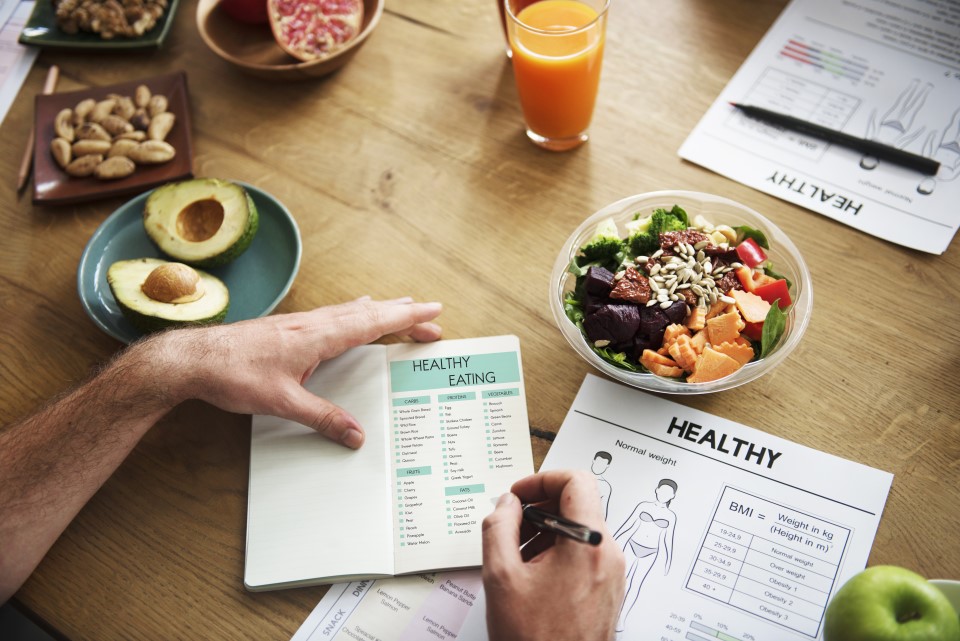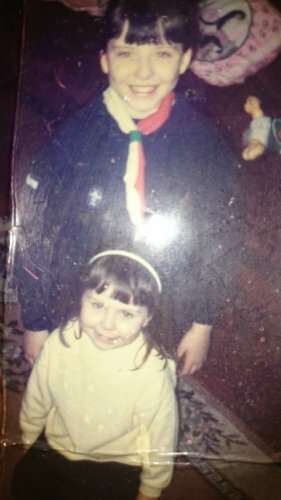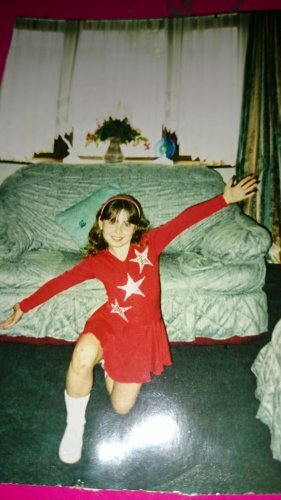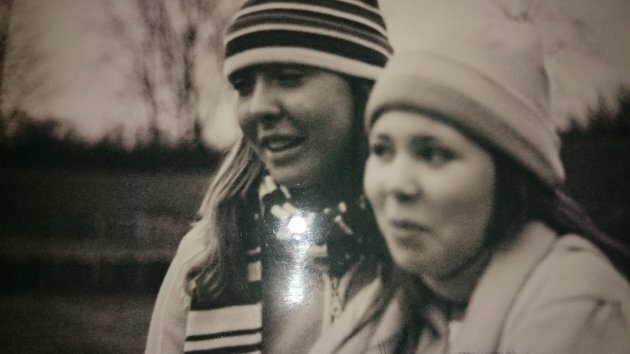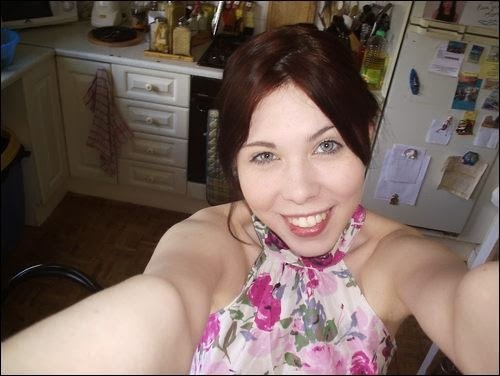IF YOU WERE to meet me in person, there are a few things you would notice. I’m very friendly, I am at ease in social situations and I appear as if I am full of confidence. And I am these things. And I’m also not.
Many of us have moments when we feel we’re putting on a show or appearing more ‘together’ and capable then we really are. So much so, it’s been given a name: Impostor Syndrome.
But what I’m going to write about in this post is something much more complicated than that. When I was younger, I was diagnosed with the eating disorder anorexia nervosa.
This is me when I was about three or four years old (I’m in the very fetching yellow). I was a happy-go-lucky kid and I had yet to think about my body, one way or another. I was more interested in singing the Barney song to my Mum and playing out my back, imagining I was in India or Africa, searching for exotic ingredients to make a perfume (yeah, I was always a weird child).
When I first became aware of my physical appearance
I loved to learn and was so excited to begin school, I actually started earlier than my peers. But, within a few years, that excitement and happiness had gone.
When I was seven, we moved house and I moved schools. It was in this school that I was bullied so fiercely that I became a shell of myself. It is also when I first became aware of my physical appearance, quickly followed by repulsion of it.
I was bullied for being smart. I was bullied for being different. I was bullied about my smile, my cheeks, my body. I was bullied to the point where my parents had to take me out of school after three of the girls jumped me in the playground, and was home-schooled for a few weeks until the school actually did something to ensure my parents that I would be protected. I was bullied until I had no self-esteem or confidence in myself.
Me, eight years old.
The seeds had been sown
Let me be clear: I do not blame these bullies for the future issues I would experience, and once I started secondary school I had a wonderful time in formal education and made friends I have to this day. I mention this experience because it was when I began to view my appearance critically.
Looking back, I can see how unnatural it is for a healthy child to be concerned about their weight and looks. But I was. I stared into the mirror and felt disgust at my too-big teeth and my too-big smile. I hated my “golf-ball cheeks” as I thought of them. I was convinced my stomach was way too big, that I was fat. I began to worry about times – such as going swimming or on holidays – when I wouldn’t be able to conceal my body. I knew the Weight Watchers points to nearly every food. While it would be some years before I would act on this, the seeds of dislike of my appearance had been sown.
Eating disorders are complex
By the time this photo was taken, I was in a secret, emotionally abusive relationship with myself. To give you an insight, a regular thought was: “Well, your looks are never going to help you, so you’re going to have to compensate with personality”, and compensate I did. My personality is naturally an outgoing and bubbly one. But I always felt like I needed to try extra hard to make up for my perceived shortcomings.
Eating disorders are complex illnesses. It can be difficult to pinpoint when exactly things take a turn for a sufferer and the transition is made to having issues with food to something less benign. But I can pinpoint mine.
I was 12 years old. I was in second year of school and I was about to go away on my first solo school trip. It was to see Celtic playing in the UK. My mum had bought me a jersey to wear for the match. A couple of days before the trip, I tried it on and went out to the hall in the apartment we were living in at the time to evaluate myself in the mirror. I stood there and cried. I felt ugly and fat and worthless. I was ashamed of how I looked. “I need to lose weight,” I thought. I became more agitated and began to sob harder because the trip was only a few days away and there was no way I could make myself beautiful by then.
And then, I had a thought. An epiphany that would set me on a road to destruction. ‘If I just don’t eat for a week, I’ll lose the weight more quickly.’
By this point, I had already been on self-imposed diets and had tried a range, from Weight Watchers to the Atkins Diet, in secret. But this idea seemed like the solution to all my problems. I’d not eat for a week, lose weight and then I would be fine and I could eat again. As you can imagine, I didn’t stop after a week.
Anorexia took a chokehold of my life
Over the next few months, anorexia took a chokehold of my life, without me even realising it. I never ate breakfast in the morning anyway, so that didn’t arise suspicion. During lunch at school, I would nibble at my food and play with it until I could throw it all away. I did after-school study and other activities and dinners were provided, so I would do what I had done at lunch – not eat. I would go home, my parents believing I had already eaten and would drink litres of cordial and water to stave off the hunger. The next day, I would get up and repeat the entire thing.
I began exercising in secret with a workout video in my room, often for 40 minutes a day, everyday. I also began dressing in baggy clothes in order to hide the body I was disgusted at. But in reality, the clothes were hiding my body as it became increasingly thinner.
My mum knew there was something happening with me. She tried to talk to me and began expressing concern over how little she saw me eat. I assured her I was fine, that I was just being more active. This wasn’t enough to quell her fears. One day, she caught me as I was making a dash from the bathroom to my bedroom after having a shower. Despite the fact I had a towel on, my mum was horrified by what she could see of me. I was skin and bones. The next day, she took me to the GP and I was diagnosed with anorexia. I was 13 years old.
For years, my eating disorder controlled my life. Despite the scrutiny I was now under from my family, I discovered new ways of disguising how little I was eating. I would pour a sprinkle of cereal and a little milk into a bowl before my parents got up in the morning so they would think that I had eaten breakfast. I started putting sandwich bags in the sleeves of my clothes, which I would then discreetly use to hide food from my plate and dispose later. I insisted on wearing my shoes at my weekly weigh-in in order hide weights in the soles and thus tack on a few numbers to my ever-declining mass. When I was caught doing that, I tried strapping the weights to my body.
Me as a teen. Despite the smile and bony figure, I was unhappy and wanted to lose more weight.
The disease is about control
Incredibly, at this point, I still thought I was too big. “Just a few more pounds,” I’d tell myself. I would set a goal weight for myself and would reach it, but I felt no happiness or joy. Instead, I kept moving the goalposts. I was in an impossible pursuit of the perfect body weight that would make me happy, but it didn’t exist. Because no matter how thin I got, I wouldn’t be satisfied. It’s that symptom of anorexia that makes it so dangerous.
While it might seem strange to say this, my anorexia wasn’t actually about how much I weighed. The disease is about control. Looking back, with the help of therapist, I was eventually able to see how the other difficult issues occurring in my life made me feel helpless. I wanted to have control over something; I decided I could have complete control of my food intake and then, even when bad things were happening, at least I was the judge of whether I would nourish my body.
It took years before I managed to recover. I would be okay for a month or two and then something, or nothing, would set me off. Anorexia was my security blanket, my best friend, my enemy. Slowly, I was killing myself. I went down to five-and-a-half stone, a completely unacceptable weight for my height and frame. An unacceptable weight for any adult.
Physical warnings
My body spent most of my teenage years barely functioning. At my “best” phases, I still would have a very low BMI. At my worst, I was severely underweight and undernourished. I had low blood pressure, which would cause me to suffer from dizzy spells and on occasion, make me faint. My body became covered in fine, downy hair as it attempted to insulate me from the constant cold I felt. My hair thinned, my lips cracked, my nails broke and split and I put increased pressure on my heart to pump. My periods stopped. I shopped for clothes in the children’s section.
Despite all of the physical warnings my body was giving me, I was delighted when I had to buy size zero jeans. It was twisted. My ribs and hip bones protruded from my body and people would stare on the odd occasions when this would be visible to them. As I journeyed towards the end of secondary school and began attending Debs with my friends, all my dresses had to be taken in and tailored in order to fit me; often right up until the day before the event.
Even then, the dress still hung loose. Underneath that gown, there was nothing of me. And at that point, I still thought I was fat.
Recovery and fears of relapse
It wasn’t until I found a wonderful Cognitive Behavioral Therapist when I was 19 that I began my recovery. It took a mountain of work but I had realised that I didn’t want to live like this anymore, I didn’t want to feel this way. Slowly, my eating improved. It was a difficult process but, eventually, I got myself back to a weight that was healthy for me and maintained it.
This is the part of the story where it’s supposed to be “Whooho, she got better!”, but it’s not that simple.
The chance of relapse is ever-present and it is something I have to keep a look out for. My weight fluctuates between normal to being on the low side, often if I’m stressed and I don’t want to eat. I am still not happy with my appearance and I don’t think I ever will be. When I look in the mirror, I don’t particularly like what I see. In my head, I will always be that awkward dumpy little girl that began this whole process. I’m very self-conscious of my body, in public and private. There is never a time when I look in the mirror and think I am beautiful; at best, I’ll settle for “you look alright.”
I wish that because I had gotten a handle on my food intake that it meant I was cured. But that’s not the case. For me, anoerxia is something I will never be entirely free from. It is a shadow in the dark, waiting for an opportunity to appear. It no longer has a hold over my physical health, but it still feeds my insecurities and my body image.
I was watching Emmerdale the other night and there is a story currently running about a previously anorexic woman who is now pregnant and as a result, her eating disorder has returned and she is harming the baby. That terrifies me. The thought that if I become pregnant, that I could become ill and harm my baby terrifies me.
We all have fears. We all feel insecure.
I won’t lie; right now, I’m really unhappy with my midriff and legs, I think I’m so flabby and fat and I want to lose weight. It is an ongoing battle. But a lot of the time, I don’t show it. I keep it to myself. I opened this article with what you would notice about me if you were to meet me in person. “She had an eating disorder” is not one of the impressions I would give, but it is a fact.
All of us, men and women, suffer insecurities about their bodies. While the majority don’t develop an eating disorder, there are so many that don’t feel confident in their appearance. We compare ourselves to Photoshopped images and celebrities whose job it is to maintain an attractive appearance; people who have hours to spend with the best personal trainer, calorie-controlled meals provided to them and a makeup and hair team on standby. This is the bar we set for ourselves and then feel like crap because we don’t meet it. We compare and contrast and judge our bodies, and place a ridiculous level of importance on how we look. Do we meet the standards of beauty in the 21st century? Even the people who create this standard don’t meet it!
I decided to share my experience because I wanted to show that no matter how confident or collected a person may seem, we all have fears. We all feel insecure. We all want to be accepted by others. Maybe we should start with accepting ourselves.
Vicky Kavanagh is a journalist and writer. Among other things, she also works as a Mental Health Ambassador for ReachOut.com. Follow Vicky on Twitter @VickyWrites or visit her blog Life of a Blackbird.

